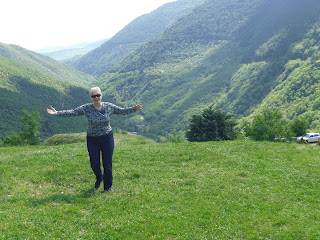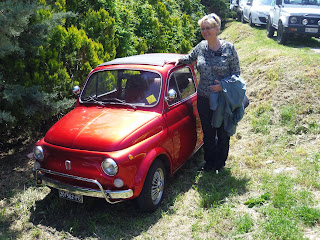Years ago when I was a young teenager and a member of a different faith, I went on a church youth field trip to see the movie "Brother Sun, Sister Moon" at a movie theatre downtown. That was my first introduction to the lives of St. Francis (Santo Francesco) and St. Clare (Santa Chiara) of Assisi and I have admired them both ever since.
For those who are not familiar with St. Francis, he was a man from the late 1100s to early 1200s of fairly wealthy circumstances who gave up all his possessions and took a vow of poverty in order to dedicate his life to helping the poor and needy and to preach repentance. He believed in following the life of Christ in a very literal sense and gained many followers. Clare was one of them and she eventually started a Nun's order that was devoted to seclusion and poverty. The movie, as I recall, depicted Francis and Clare as having some sort of potential romantic relationship, but I can't see anything in my historical readings that verifies that.
There is some speculation that Francis was influenced by a French man by the name of Peter Waldo who also espoused very similar beliefs and lifestyle in the same time period, and eventually led a religious movement called the Waldensians. The Waldensians, however, became a persecuted people by the established Catholic church and eventually aligned themselves with Protestant movements. They also came to live in secluded areas because of persecution including Torre Pelice in the northern Alps of Italy where Lorenzo Snow and his associates converted many people to the Church of Jesus Christ of Latter-day Saints in the early 1850s.
Although St. Francis seems to have followed the same ideals as Peter Waldo and his followers, the difference was that St. Francis sought the Pope's blessing for him and his followers and adhered to the Pope's command that he would only preach in areas where the Bishops allowed it. Therefore, instead of becoming persecuted and a pariah, he has become a revered figure in the Catholic Church as well as other Christian faiths. Francis even went to Egypt at one time to try and convert the Sultan in order to end the Crusades. He was truly a man of peace and love. The current Pope Francis, of course, took his name when he became pope.
So with that little history lesson behind us, and as you can probably guess, we got to go to Assisi last weekend. What an absolute jewel that town is! This was a trip that was planned with three other senior couples and we had the most wonderful time. We were there particularly to see a medieval festival called Calendimaggio. This is a festival where two sides of the city compete against each other in drumming, archery, music and more. You can find out more about it here: http://www.montesubasio.it/en/assisi-calendimaggio/
Here are some pictures of othe town:
Quite by accident, we came across a tiny little church, St. Stephens, which dates about the time Francis lived. Unlike the ornate cathedrals that are in Assisi, this is a humble little church. I can just imagine this is the type of place Francis would have been comfortable in.
When we were there, there was a group of four people singing together inside.
Our group was disappointed to discover that there were no tickets for the festival shows when we got there. But as Sister Sears said, we "made lemonade out of lemons" by finding a spot where one of the performing groups was readying themselves to enter the performance area and we got a good look and felt part of the action.
I thought this was such a good picture of Elder Sears standing by the action too:
We had a lovely dinner all together in a restaurant in a building dating from the middle ages. Beside me is Elder and Sister Guercio, beside them is Sister and Elder Sears and beside them beside my husband is Elder and Sister Thacker (sorry Sister Thacker - we can't see you very well).
The highlight of our Saturday (the next day) was going up to the castle at the top of Assisi. Just outside the castle walls with a view of the Umbria valley, I did my best "Hills Are Alive..." impression:
There is a tower in the castle that takes a little bit of adventuring and a lot of climbing to get up to but once you are there, you get a full 360 degree view of the countryside around Assisi. What a treat! Here is the narrow little tunnel we had to climb through to get to the bottom of that tower:
And here is us at the top:
This is the most beautifully restored Fiat 500 (from the 1960s) we have ever seen. Honestly, when you see those little cars (which are smaller than the current Fiat 500s) you feel like giving the car a pat on the head and a puppy treat. Cutest car ever!
Here's an "ick" moment. There's this fence outside of the castle where people stick their chewing gum for reasons I can't fathom:
So as the sun sets on this blog post....
let me leave you with the famous and beautiful prayer of St. Francis. May it be all of our hopes and prayers in our own thoughts and words:
Lord, make me an instrument of Your peace. Where there is hatred, let me sow love; where there is injury, pardon; where there is doubt, faith; where there is despair, hope; where there is darkness, light; where there is sadness, joy.
O, Divine Master, grant that I may not so much seek to be consoled as to console; to be understood as to understand; to be loved as to love; For it is in giving that we receive; it is in pardoning that we are pardoned; it is in dying that we are born again to eternal life.

























































